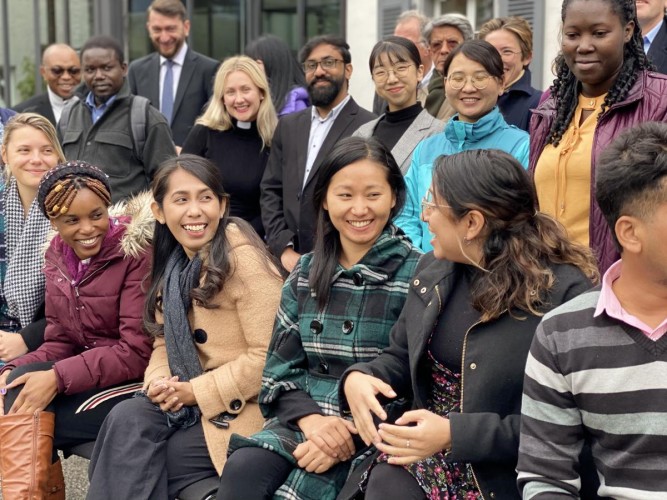Our communities are enriched by religious and multicultural diversity..
Today in Australia, the diverse faith groups and faith in God is targeted and being attacked and blamed-more than no time in our history. Religious institutions of all persuasions are being pressured by new legal norms, and the people of faith are made prey.

With over 65% of Australians professing belief in a world religion, Australia is in fact very religious, and culturally diverse. But over the course of our recent history, most faith communities have experienced the harms of hateful coercion, where members of a particular faith group are pressured or compelled to relinquish or violate their beliefs to satisfy the demands of social or political forces.
The legacy of the professional and social exclusion being experienced by many people of faith is growing and now affecting millions of Australians. This exclusion is eroding away our fundamental human rights to freedom– to believe as we choose for all faith groups– which is central to what makes Australia great.
LIVE is dedicated to protecting the integrity of religious freedom for people of faith across Australia. Today in Australia the diverse faith groups and faith in God is targeted and being attacked and blamed more than no time in our history. People of faith of all persuasions are being pressured by new legal norms and are being made prey of hateful attacks.
Our communities are enriched by religious and multicultural diversity.
UN Universal Declaration of Human Rights - Article 18: Right to freedom of thought and religion protects the human right to believe as we choose, without fear of discrimination or harm. But over the course of our history, the promise of religious freedom has often fallen short of its practice.
Through policy research, public education, grassroots organising, and advocacy, LIVE leverages our unique perspective and expertise to advance policies that protect people of all faith communities, and ensure that we all receive equal treatment under law.

Toward an inclusive, forward-thinking vision of religious freedom.
Across issue areas, we strive to shift how the diverse religious groups figure into policy discussions – away from the public perception that people of faith uniformly share a particular worldview, or vote a certain way, or are of a certain race or negative stereotype, and toward an inclusive, forward-thinking vision of religious freedom.
Learn More about Smearing of Multi-faith Religious Freedom: Countering the Smearing of Religious belief targeted at Australia's people of diverse multi-faith religious orientation guarantees every Australian the ability to make their own decisions about religion – to affirm, embrace, and practice the religion of their choice as a matter of conscience and conviction.
Endorsing Multi-faith Religious Freedom protects all from government and/ or agenda driven intrusion into our personal beliefs and religious expression.
However, from employment to child welfare, smearing of religious freedom has increasingly been gaining ground to justify actions, often racist in nature, that harm faith communities Australia wide.
Smearing Multi-faith Religious Freedom includes those who refuse service to those people of diverse religious communities who believe or live differently than you do-
Whether it’s any xenophobic combination of the following - it is ultimately about power and ignorance-
Religious freedom is a core value for Australians and a fundamental human right reflected in the UN Universal Declaration of Human Rights - Article 18: Right to Freedom of Thought and Religion
What is Religious Freedom: Freedom of religion protects our ability to follow the religious tradition of our choice, without facing discrimination or punishment. These protections are necessary to ensure religion and democracy thrive.

But there is a concerted effort underway to distort religious freedom that seeks to enshrine ultimately hateful anti-religious beliefs into law, and undermine basic human rights protections, and concentrate power in the hands of a select few – at the expense of all people of faith from the various religions Australia-wide.
Multi Faith Religious freedom is a core value for Australians and a fundamental human right reflected in the UN Universal Declaration of Human Rights -
Article 18: Right to Freedom of Thought and Religion
Based in Sydney, with state and local affiliates nationwide, LIVE mobilises a diverse network of advocates and allies around the shared commitment to advancing true religious freedom for all.
LIVE brings together Australians of diverse religious perspectives and racial orientations to protect and promote freedom of multi-faith religion, and ensure that all of us maintain the basic human right to believe and to worship as we choose.

"Australians Muslims - and people of minority faiths more generally - need a form of recourse to challenge those who openly vilify them,"
In 2020, Australia’s Muslim community urged the Morrison government to redraft its religious discrimination laws to include an anti-vilification provision, saying incitement of hatred and violence is a "fundamental threat to Australian Muslims".
"Australians Muslims - and people of minority faiths more generally - need a form of recourse to challenge those who openly vilify them," they say.
A coalition of about 150 Muslim groups say Australian Muslims [and people of minority faiths] are vulnerable to hate-speech vilification because they are "readily identifiable" by their names, appearance and dress and the places they worship.
The groups, which include the Australian National Imams Council, the Australian Federation of Islamic Councils and the Lebanese Muslim Association, say anti-Muslim content has become "mainstream" online, which in turn, makes it "normal" to attack Muslim Australians.
In a submission to the government's consultations on the religious discrimination laws, they said extra measures must be included to allow them to express their religious identity and feel safe.
"Australians Muslims - and people of minority faiths more generally - need a form of recourse to challenge those who openly vilify them," they say.
In 2020, Australia’s Muslim community urged the Morrison government to redraft its religious discrimination laws to include an anti-vilification provision, saying incitement of hatred and violence is a "fundamental threat to Australian Muslims".
"Australians Muslims - and people of minority faiths more generally - need a form of recourse to challenge those who openly vilify them," they say.
A coalition of about 150 Muslim groups say Australian Muslims [and people of minority faiths] are vulnerable to hate-speech vilification because they are "readily identifiable" by their names, appearance and dress and the places they worship.
The groups, which include the Australian National Imams Council, the Australian Federation of Islamic Councils and the Lebanese Muslim Association, say anti-Muslim content has become "mainstream" online, which in turn, makes it "normal" to attack Muslim Australians.
In a submission to the government's consultations on the religious discrimination laws, they said extra measures must be included to allow them to express their religious identity and feel safe.
"Australians Muslims - and people of minority faiths more generally - need a form of recourse to challenge those who openly vilify them," they say.
The submission says there have been worrying Islamophobic attacks since the deadly Christchurch mosque shooting in 2019. It points to the Holland Park Mosque in Brisbane which was vandalised with the words "St Tarrant", in reference to the Christchurch shooter, as well as a Nazi swastika.
It also says harmful content about Muslims has become "mainstream" online.
The poll found: 64 % of Australians agreed that people’s right to express their faith should be legally protected
Almost two thirds of Australians support people’s legal right to choose and express their religious faith, a new poll shows.
The survey also found a majority say health professionals and organisations of faith should not be forced to perform services which contravene their religious beliefs, while 60 per cent say religious schools should not be forced to employ staff who are in conflict with their statement of faith.

Almost two thirds of Australians support people’s legal right to choose and express their religious faith, a new poll shows.
The survey also found a majority say health professionals and organisations of faith should not be forced to perform services which contravene their religious beliefs, while 60 per cent say religious schools should not be forced to employ staff who are in conflict with their statement of faith.
The National Poll on Religious Freedom in Australia, commissioned by the Australian Christian Lobby and released on Wednesday, canvassed 1003 people in August of this year, on four key questions relating to ethical issues and faith.
They sought views on:
The poll found: 64 per cent of Australians agreed that people’s right to express their faith should be legally protected, while 55 per cent of respondents said faith-based hospitals and religious health practitioners should not be forced to undertake such services.
ACL Managing Director, Martyn Iles, says the poll results showed Australians supported the protection of “people of faith, as well as faith- based institutions and their values”.
“Further, there is strong majority support for protections for Australians from the creeping overreach of their employers into their private lives,” Iles said.
“Polling reveals that 71 per cent of Australians believe that employers should not be able to restrict employees’ statements of religious belief, made on the employees own time.”
He said both the Coalition and the Labor Party had committed to providing protections for Australians of faith and the poll results showed “the Australian public are on side”.
“They share the aspirations of faith-based Australians to express their faith, on their own time, without fear of discipline at work. They support the need for [places of worship] churches, schools, and hospitals to have employees that share their values.

In public discourse, there’s a lot of focus on whether trans women should be counted as women. Whatever the ultimate answer, that’s obviously a reasonable question, despite trans activists’ attempts to count it as “transphobic”.
Are Transwomen Female? Is there a Difference?
In public discourse, there’s a lot of focus on whether trans women should be counted as women. Whatever the ultimate answer, that’s obviously a reasonable question, despite trans activists’ attempts to count it as “transphobic”.
One problem is that, since “woman” and “female” are interchangeable in many people’s minds, we’re likely to lose a secure understanding of the related concept “female”. Yet the existing concept is in good order. It designates a person with XX chromosomes, and for whom ovaries, womb, vagina and so on are a statistical norm, even if some females are born without some of these, or lose one or more later.
The category “female” is also important for understanding the particular challenges its members face, as such. These include a heightened vulnerability to rape, sexual assault, voyeurism and exhibitionism; to sexual harassment; to domestic violence; to certain cancers; to anorexia and self-harm; and so on. If self-declared trans women are included in statistics, understanding will be hampered.
In a sexist world which often disadvantages females, as such, we need good data. We need good data about trans people too, of course, but the two tasks should be separated.
If we lose a working concept of “female” in the way indicated, self-declared trans women (males) may well eventually gain unrestricted access to protected spaces originally introduced to shield females from sexual violence from males. We are already seeing the erosion of these, as companies and charities open formerly female-only spaces such as changing rooms, shared accommodation, swimming ponds, hospital wards, and prisons, to everyone out of a desire not to appear transphobic.
These are only some of the harms associated with introducing self-declaration as the defining criterion of being trans, whilst simultaneously counting trans women automatically as women.
